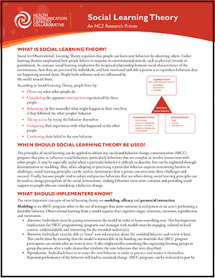Social Learning Theory
Social (or Observational) Learning Theory stipulates that people can learn new behaviors by observing others. Earlier learning theories emphasized how people behave in response to environmental stimuli, such as physical rewards or punishment. In contrast, social learning emphasizes the reciprocal relationship between social characteristics of the environment, how they are perceived by individuals, and how motivated and able a person is to reproduce behaviors they see happening around them. People both influence and are influenced by the world around them.
Last modified: July 23, 2021
Language: English

